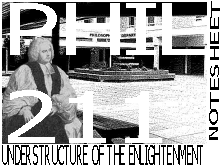

"The heart of empircism is the doctrine that we have no approach to the external world except through the senses." R.I. Aaron The Theory of Universals, Oxford, 1952, Clarendon, p. 21.
John Locke starts off a tradition of thought within the Modern world which attributes all our knowledge to the information that is given to us, one way or another, through our 'senses', very broadly conceived.
Locke was a don in Oxford for a period, but it was as a man of affairs, engaged
in the cultural and political milieu of an altogether unstable time, that he
pursued his writing.
Locke's project, which is to give a scientific account of the workings of the mind, involves him in addressing pretty well all the great philosophical problems.
To read: Locke, Essay, Book II Chapter 23 Sections 1-6
What Locke is saying basically is that the Scholastic notion(s) of substance, heavily drawn on by Descartes, must be swept away.
I think what Locke is saying is that some people operate with a notion (which they call 'substance') of a kind of substrate in which properties inhere. But they can't say anything more about this supposed 'substrate'. So it's too vague a notion to be really meaningful or useful.
Locke : the important items are not substances at all (pace the Scholastics) but qualities. Insofar as we are to understand anything it is qualities we must concentrate on.
Locke is doing something absolutely revolutionary here. He is constructing our modern notion of a 'thing' and a thing's 'properties' , against a Scholastic background which didn't have 'things' in the modern sense but 'substances' and 'accidents' and 'forms'.
Locke is committed to the thesis that in looking at what we call a 'table' we get a number of ideas of qualities. This contrasts with saying that when you look at a table you get directly through your senses the idea of a table. Locke is thus rejecting the thesis that when you perceive an object you get directly an idea of that thing. Instead he held that what you get through the senses are ideas of qualities., and it is your mind which 'constructs' the 'thing'
"... we come to have the ideas of particular sorts of substances, by collecting such combinations of simple ideas as are, by experience and observation of men's senses, taken notice of to exist together; and are therefore supposed to flow from the particular internal constitution, or unknown essence of that substance." Essay, Bk II Chapter XXIII, Section 3.
"The mind being, as I have declared, furnished with a great number of simple ideas conveyed in by the senses, as they are found in exterior things, or by reflection on its own operations, takes notice also that a certain number of these simple ideas go constantly together; which, being presumed to belong to one thing, and words being suited to common apprehensions and made use of for quick dispatch, are called, so united in one subject, by one name; which, by inadvertancy, we are apt afterward to talk of and consider as one simple idea, which indeed is a complication of many ideas together: because, as I have said, not imagining how these simple ideas can subsist by themselves, we accustom ourselves to suppose some substratum wherein they do subsist, and from which they do result; which therefore we call substance."Locke's Essay, Bk II, Ch. XXIII, Section 1.
This is one interpretation of what Locke is arguing:
He asks: How do you get the idea of a particular object? and answers:
When I look at an object, through my senses I get a set of ideas, each corresponding to one of the object's qualities. E.g. the idea of brown, the idea of rectangularity, the idea of hardness. Such sets of qualities appear to recur repeatedly. I infer from this fact that the set of qualities "inhere" in "something".
Our idea of a 'something' which we think of a set of qualities as 'inhering in' is our idea of a 'particular substance'. It is really a confusion on out part.
The key point is that he is rubbishing the Scholastic concept of 'substance' (which Descartes has not demolished) and putting in place the Modern concept of a thing.
VP